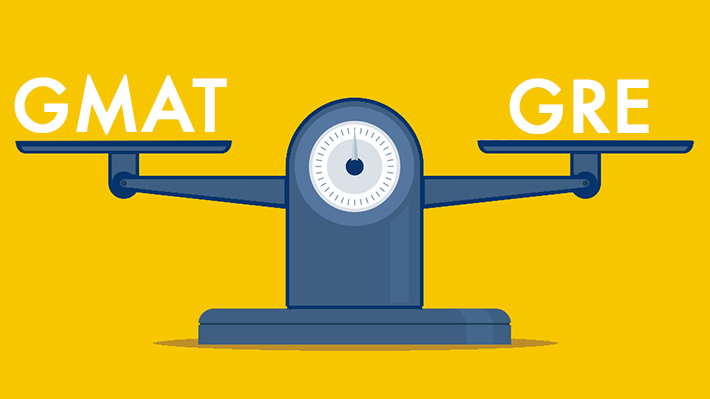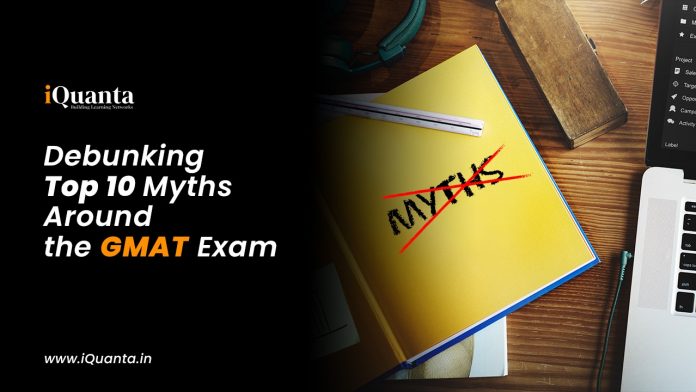Common GMAT Myths
The GMAT exam gets you into the top B-schools globally. Around 2-2.5 lakh people appear for the exam globally every year. With such a crowd also comes a great deal of perceptions and myths. So, it is very important to let go of any confusion regarding the exam so that you do not face any hindrances while preparing. For this reason, here we are to debunk 10 GMAT myths.
GMAT Myth 1: GMAT tests your intelligence.

GMAT has not got a lot to do with your IQ. This exam is not a test of human intelligence. The GMAT tests your analytical and critical reasoning skills. It needs a non-theoretical approach towards problem solving. It’s not like you won’t be able to crack the exam with a lower IQ. All this exam needs is practice. This exam will test your skills which can be developed by consistent determination and practice.
GMAT Myth 2: One month is enough for GMAT preparation.
One of the major GMAT myths. People are generally confused about the preparation time required for GMAT. For busting these GMAT myths you need to understand, as already mentioned, GMAT is a skill based test and building skills and gaining confidence over it takes time. For this purpose, preparing for a month is simply not enough. You need to give your preparations atleast 3-4 months with consistent practice. Start by practicing basic questions and gradually move on to the tougher ones. This exam gets you into world’s top B-school which in turn fetches you a package in crores. So underestimating this exam won’t be a wise decision.
Get the GMAT Online Coaching by iQuanta
GMAT Myth 3: Practice the toughest of questions to crack GMAT.

This is absolutely not true. GMAT is a computer adaptive tests and it starts from level one. So, prepare in an adaptive manner as well. Start by solving easier questions and building up your base. Once that is done, increase the difficulty level of questions by a bit. This will increase your accuracy as well as help you monitor the time taken. Sometimes the questions are so tough that you wouldn’t be able to solve it even after giving it your all. This is one of the common GMAT myths that goes around. So instead of wasting your time on such questions, just move on to the next.
GMAT Myth 4: If an easy question comes up, it means that your answer to the previous question was incorrect.
Not really. There is no such definition as to what is tough or easy. This concept is subjective in nature. What might be easy for you, might be difficult for someone else and vice versa. And even if this was true, so what? Can you do anything about it? No! So just don’t let it dampen your spirits. Not all your answers are going to be correct. Instead of focusing upon this myth around GMAT, focus on the next and upcoming questions.
GMAT Myth 5: Even if you get a good GMAT score , you won’t be able to afford the top B-schools.

WRONG! B-schools all over the world offer scholarships and fellowships to the candidates having a good GMAT score. In addition to this a good GPA, resume, prior experience and extra-curricular activities can also get you a waiver on your tuition fee. In some cases, there are scholarships provided upto 100%. You can also apply for student loans and repaying them once you get placed would not be very tough as the ROI is great after pursuing MBA from a top college.
GMAT Myth 6: Answer all the questions correctly for a high score.

This is one of the commonly heard myths around GMAT. The GMAT algorithm assesses your overall performance, considering the difficulty level of the questions that you were provided . For example, Student A would receive a higher score if they missed 10 questions but had more difficult questions than student B who missed 8 questions but had simpler questions. Due to the adaptive structure of the test you will miss 20-30% of the questions regardless of your score. The purpose of the test is to find the proper degree of difficulty for you, and once they find it, you may notice an alternating pattern of correct and incorrect responses as the test makes modest adjustments in difficulty as you move forward to the next questions.
GMAT Myth 7: GMAT requires advanced mathematical skills.

According to these myths around GMAT, you need to be an expert at everythings. Understanding the principles is crucial in to tackle Math problems. The idea is to use your understanding of core concepts and strengthen your basics to learn how to apply them in many contexts. Work diligently and hard. If your math skills aren’t strong when you start studying for the GMAT exam, they will be by the time the exam date approaches. Focus first on accuracy and practice as many sets as possible. Speed will automatically come with time.
GMAT Myth 8: A high GMAT score is enough to get you into your dream B-school.

Many a times, a lot of you would have heard this. “Score 700+ in GMAT and the best B-schools are waiting for you.” No buddy, they are not! Your admission to the top B-schools like Harvard, Wharton, Insead, etc. depends on a lot of factors. A good GMAT score is not enough. Interviews, essays, work experience, LORs and SOPs hold an equal importance. This is one of the most common myths around GMAT.
GMAT Myth 9: GMAT is tougher than GRE.

Both the GMAT and the GRE have nearly identical mathematics content. According to popular belief, the GRE contains more geometry than the GMAT, while the GMAT contains more counting and combinatorics problems, which many students fear. The main difference between these two exams is that the GRE focuses more on the theoretical, old-school math whereas the GMAT emphasises “Quantitative Reasoning”, or your ability to reason logically about quantitative problems.
GMAT Myth 10: If you have a good vocabulary, you can easily ace the verbal section.

Having a good vocabulary helps but is not essential for the GMAT exam. You should just know enough to understand and effectively communicate your thoughts. Reading is important, yes, but memorizing big and heavy words is not. Vocabulary based questions are not asked in GMAT and to express yourself, you don’t need to know difficult words.
These were the top 10 GMAT myths. What you need to do is not to give a heed to them and just keep preparing.
For comprehensive guidance and to enroll for iQuanta’s newly launched GMAT Course, visit the link below.
For daily practice questions and 24*7 doubt clarification, join the group linked below






